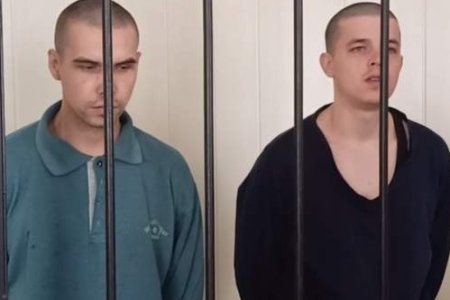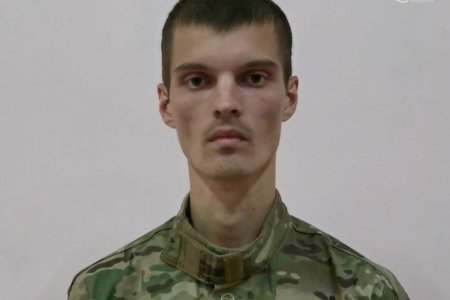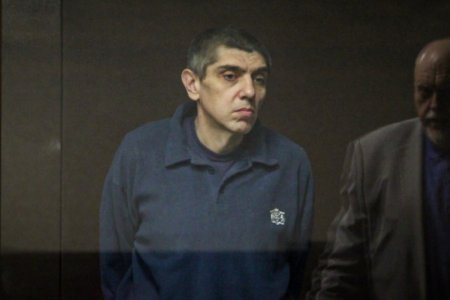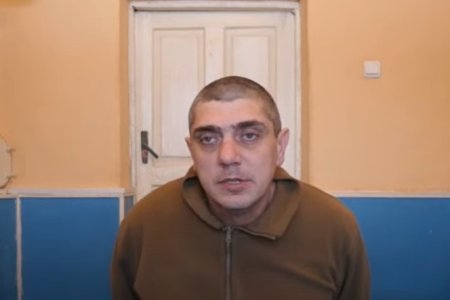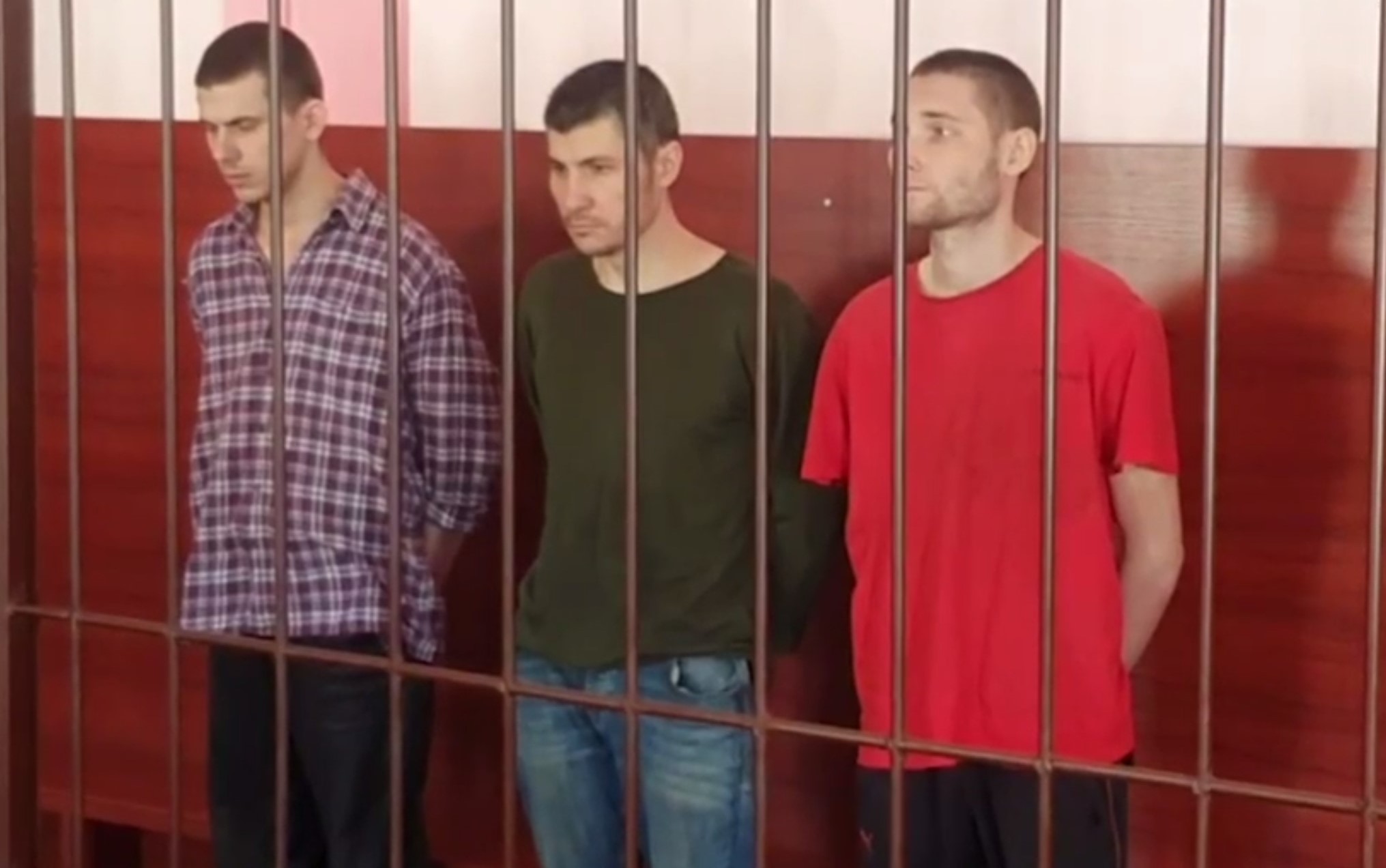
Over recent weeks unrecognized ‘courts’ in Russia’s proxy ‘Donetsk and Luhansk people’s republics’ [‘DPR’, ‘LPR’] have passed a huge number of 20-year and higher ‘sentences’ against Ukrainian prisoners of war [POW]. It is near certain that the prisoners have been deprived of any access to independent lawyers and neither UN, nor International Committee of the Red Cross (ICRC) have been allowed to visit them. There are, in short, no grounds for believing that these so-called ‘trials’ are anything but judicial travesties, with Russia deliberately hiding behind such proxy entities to flagrantly violate its obligations under international law to properly treat prisoners of war. This is especially evident as the reports come from the Russian Federation’s Investigative Committee [IC] and even claim that their ‘investigators’ gathered the ‘evidence’. Russia is prohibited by the Third Geneva Convention from prosecuting prisoners of war merely for carrying out their duties. Even POWs are answerable for war crimes, however here the other stipulations of the same Convention come into force. Prisoners of war must not be tortured or otherwise face duress in order to extract ‘confessions’ from them, and they must have had the assistance of an independent lawyer and been able to present their defence.
Were there genuinely any proof to back the charges against the POWs, Russia would not need to stage such ‘trials’ on territory to which no international monitors, independent media or human rights NGOs have any access. The IC reports are, in general, the first mention even that the prisoners of war were ‘on trial’.
Andriy Klementovych; Ivan Melnykovych and Artur Syvitsky
On 21 August, the Russian Federation’s Investigative Committee reported that 26-year-old Klementovych; Melnykovych (24) and Syvitsky (31), all Ukrainian defenders from the Azov Regiment, had been ‘sentenced’ by the so-called ‘DPR supreme court’ to 20 years’ harsh-regime imprisonment.
Russia’s IC claims that the sentences were “for crimes against civilians in Mariupol”, with the three Ukrainian defenders charged under Russian law with ill-treatment of the civilian population (Article 356 § 1 of Russia’s criminal code); and attempted murder of two or more people by an organized group for motives of ideological enmity (various parts of Article 105) and Article 30 § 3).
The cynicism behind these charges is breathtaking. IC claims that the three Azov Regiment soldiers “took part in military action in Mariupol, preventing the exit of civilians from the city by humanitarian corridors presented by the armed forces of the Russian Federation.” Russia’s attack on the city, with relentless bombing and shelling of entirely civilian targets. is well-documented, as was the virtual blockade of the city, with Ukrainians prevented from leaving for safer Ukrainian territory. Russia’s effectively forced deportation of Ukrainian civilians to Russia or occupied Crimea also received international condemnation.
IC goes on to assert that in March 2022, the three Ukrainians, while supposedly moving to a new position in a school building discovered “a car in which there were two men not taking part in the armed conflict.” It is claimed that the Ukrainian defenders assumed that the two men supported what IC refer to by Russia’s euphemistic term as the ‘special military operation’ and held pro-Russian views. The Ukrainian defenders are then supposed to have fired 50 shots at the “victims”, yet one is alleged to have managed to “leave the car when it stopped and hide” while the other is supposed to have “hidden in the car” and thus survived.
A similarly implausible claim is additionally made against Klementovych with the ‘victim’ also somehow having to flee with an alleged gunshot wound.
Vasyl Shytria
20-year-old Shytria is from the 56th Separate Motorized Infantry Brigade of Ukraine’s Armed Forces and was taken prisoner while defending Mariupol in 2022. Russia’s Investigative Committee reported on 15 August that he had been ‘sentenced’ by the same ‘DPR supreme court’’ to life imprisonment, supposedly for killing four civilians. The charges here also are under Article 356 § 1 (ill-treatment of civilians) and 105 and 30 (murder of two or more people by an organized group for motives of ideological enmity). He is claimed to have killed two men and two women, on orders from his commander.
Unlike Klementovych; Melnykovych and Syvitsky who are claimed to have fired 50 shots at one car, with both ‘civilians’ surviving the attack, Shytria is alleged to have fired 27 shots and killed all four ‘civilians’. The only ‘evidence’ here would appear to be his supposed ‘confession’ and ‘repentance’. It is horribly evident that Shytria is reciting what he has been forced into saying.
Viacheslav Symbirsky
On 22 August, another Ukrainian defender from the 56th Separate Motorized Infantry Brigade was ‘sentenced’ in ‘DPR’ to 22 years with it claimed that he had killed a civilian on 5 March 2022, and that he “fully admitted his guilt”.
Yan Khudoba
On 31 May, Gazeta.ru reported that the same ‘DPR supreme court’ had sentenced Yan Khudoba, described as a Ukrainian marine sniper to 23 years. This was for supposedly killing “a volunteer” in Mariupol.
Once again, he is alleged to have “admitted guilt and repented”,
Volodymyr Krotovsky
TASS reported on 23 August that this marine had been ‘sentenced’ by ‘DPR supreme court’ to 22 years with it claimed that he had shot at a car with a civilian in it in March 2022. Using a Kalashnikov rifle he had purportedly fired 30 times at the car, with the man inside uninjured and managing to get away.
Pavlo Artemenko and Anton Romaniuk
The charges against the Azov Regiment defenders above are essentially identical and the ‘evidence’ as lacking, as in the ‘trials’ and 24-year sentences passed on or around 16 August against two other Ukrainian prisoners of war from the Azov Regiment - Pavlo Artemenko and Anton Romaniuk, Those, in turn, differed very little from the charges and 25-year sentence, passed on 10 August, against another Azov Regiment POW, Anatoliy Kiliushyn. On that occasion, in particular, the Russian state media reports gave strong grounds for suspecting that the ‘case’ was built around a ‘confession’ almost certainly tortured out of the 27-year-old soldier.
Similar charges were also used on 7 August 2023 to sentence three Ukrainian marines: : 20-year-old Andriy Kovtun; Danylo Ovchynnykov (22) and Yury Tyshchenko (24) to 29 years.
On 14 August, Russia’s prosecutor general reported yet another 25-year ‘DPR sentence’ against another Azov Regiment POW. Andriy Bohdan was charged under the same articles of Russia’s criminal code as Pavlo Artemenko and Anton Romaniuk, except that he was accused of killing a wounded ‘DPR soldier’.
The ‘sentences’ and the methods used to obtain them do not differ significantly in the so-called ‘Luhansk people’s republic’ [‘LPR’].
Serhiy Boichuk
On 28 August, Russia’s IC reported that the ‘LPR supreme court’ had ‘sentenced’ Serhiy Boichuk from Ukraine’s Armed Forces to 20 years using the same articles of Russia’s criminal code as the cases in ‘DPR’. Russia, which has been relentlessly bombing Ukrainian residential blocks and other civilian targets since 24 February 2022 is claiming that Boichuk and his unit shot at a residential area “in order to intimidate the civilian population who were against the Ukrainian soldiers and to destroy apartment blocks.”
Yury Bosovych
On 24 August, the same Russian IC reported that Yury Bosovych had been ‘sentenced’ to 16 years, with it alleged that he had shelled a residential building in Popasna in April 2022.
Andriy Bardash
Back in May 2023, Russia’s IC reported that the same unrecognized ‘LPR supreme court’ had sentenced POW Andriy Bardash to 16 years. It claimed that on 6 March 2022, in the city of Popasna, Bardash had thrown a grenade at a residential building “so that civilians could not live there”.
The above ‘sentences’ reported by the Russian Investigative Committee, yet allegedly passed, in the absence of any accountability or guarantees for the right to a fair trial, by the so-called ‘LPR supreme court’, all show supposed ‘interviews’ with the Ukrainian prisoners of war. It seems likely that such ‘testimony’ is the sole ‘evidence’ for the charges against the men.
The charges over alleged shelling in Popasna are particularly cynical. Popasna was a small city in Luhansk oblast until the Russians began mercilessly bombing and shelling it in order to claim it “for Russia”. They have since acknowledged that it was so destroyed that they will not even try to rebuild it (details and links to CNN footage confirming this here).
Luhansk oblast
The ‘sentences’ and the methods used to obtain them do not differ significantly in the so-called ‘Luhansk people’s republic’ [‘LPR’].
Serhiy Boichuk
On 28 August, Russia’s IC reported that the ‘LPR supreme court’ had ‘sentenced’ Serhiy Boichuk from Ukraine’s Armed Forces to 20 years using the same articles of Russia’s criminal code as the cases in ‘DPR’. Russia, which has been relentlessly bombing Ukrainian residential blocks and other civilian targets since 24 February 2022 is claiming that Boichuk and his unit shot at a residential area “in order to intimidate the civilian population who were against the Ukrainian soldiers and to destroy apartment blocks.”
Yury Bosovych
On 24 August, the same Russian IC reported that Yury Bosovych had been ‘sentenced’ to 16 years, with it alleged that he had shelled a residential building in Popasna in April 2022.
Andriy Bardash
Back in May 2023, Russia’s IC reported that the same unrecognized ‘LPR supreme court’ had sentenced POW Andriy Bardash to 16 years. It claimed that on 6 March 2022, in the city of Popasna, Bardash had thrown a grenade at a residential building “so that civilians could not live there”.
The above ‘sentences’ reported by the Russian Investigative Committee, yet allegedly passed, in the absence of any accountability or guarantees for the right to a fair trial, by the so-called ‘LPR supreme court’, all show supposed ‘interviews’ with the Ukrainian prisoners of war. It seems likely that such ‘testimony’ is the sole ‘evidence’ for the charges against the men.
The charges over alleged shelling in Popasna are particularly cynical. Popasna was a small city in Luhansk oblast until the Russians began mercilessly bombing and shelling it in order to claim it “for Russia”. They have since acknowledged that it was so destroyed that they will not even try to rebuild it (details and links to CNN footage confirming this here).
The above are almost certainly only some of the ‘sentences’ handed down by illegitimate entities in the absence of even the most basic elements of a fair trial. As reported earlier, Russia began ‘rewriting’ the facts essentially as soon as it seized control of Mariupol, extracting ‘witness testimony’ from civilians forcibly deported to Russia. It had used similar methods in 2014, but here, it produced videos with people trying to blame Ukrainian soldiers for Russia’s worst and least deniable war crimes such as the bombing of a Mariupol maternity hospital on 9 March 2022 and the Drama Theatre, sheltering over a thousand civilians, on 16 March. The ‘confessions’ and / or ‘witness testimony’ cited to back the charges against the above prisoners of war, in the absence of independent lawyers, free media and international observers, were almost certainly obtained using inadmissible forms of duress.
